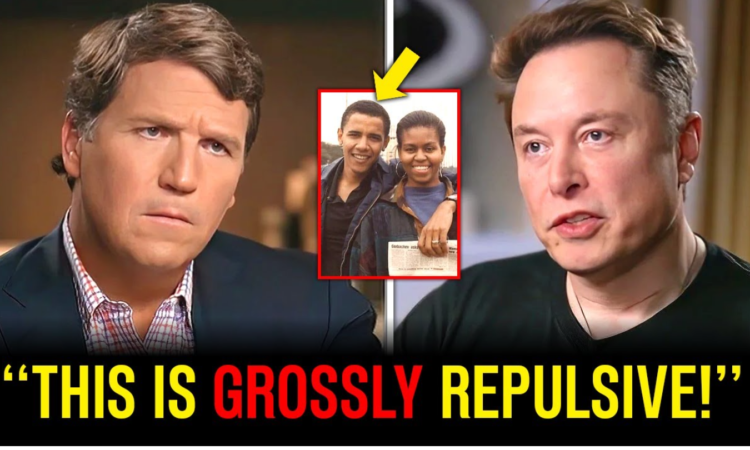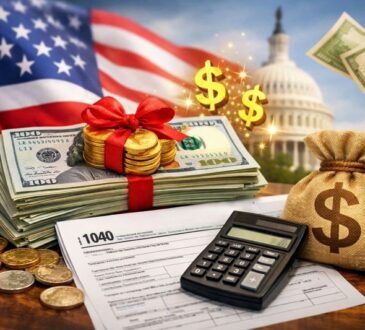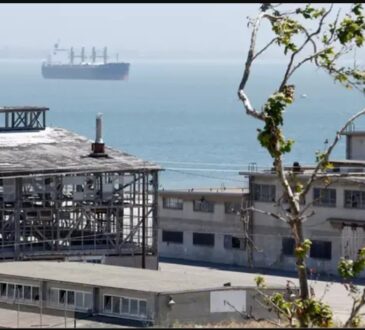
The world watched as former President Barack Obama left the White House in 2017, but according to Elon Musk, his influence never truly faded. In a stunning interview with Tucker Carlson, Musk peeled back the layers of what he calls a “system of influence”—one that allows former presidents to amass immense wealth and global power long after their time in office.
Carlson, adjusting his tie, leaned forward, his sharp expression filled with anticipation. “Tonight,” he began, “we’re going to talk about something that’s been hiding in plain sight. Something so massive, so deeply ingrained in how modern politics work, that most people don’t even question it. But once you hear what we’re about to discuss, you won’t be able to ignore it anymore.”
The tension in the studio was thick as the camera shifted to Elon Musk, seated across from Carlson. Musk, appearing composed yet intense, took a deep breath before speaking.
“Tucker, let me put it this way,” Musk started. “Obama’s post-presidency isn’t just about book deals and speaking fees—it’s about a system. A system that lets people who were supposed to serve the public walk away with fortunes rivaling Silicon Valley billionaires. And the real question is: Who’s funding it, and what are they getting in return?”
Carlson’s brows furrowed as he absorbed Musk’s words. “This isn’t just another political discussion,” he responded. “This is something deeper. Something bigger. You’re saying there’s more to this than just making money after leaving office?”
Musk nodded. “A lot more. Look, people think politicians retire into a quiet life. But that’s not what happens. They enter a different game—one where influence is the currency. And Obama? He’s mastered it.”
Musk laid out a series of financial figures that raised eyebrows.
“Let’s start with real estate,” he said. “Obama bought a massive mansion in Martha’s Vineyard for $12 million. Then there’s his D.C. estate—another multi-million dollar property. A third home in Hawaii. These aren’t just houses, Tucker. They’re fortresses. Yet the public was told these purchases came from book deals and speeches.”
Musk continued, “His memoir deal was reportedly $65 million. His speaking fees, upwards of $400,000 per event. Now, at face value, that’s a lot of money. But when you consider his lifestyle, his investments, his foundation, and his global partnerships, this isn’t a man living off old book royalties. This is a man still playing the game—at a level nobody’s talking about.”
Carlson pressed further. “So you’re saying these book deals, these speaking fees, they’re just a cover?”
Musk smirked, but there was no humor in it. “A distraction. The real money isn’t coming from publishing houses or lecture halls. It’s coming from something much bigger—private deals, global partnerships, and most importantly, strategic alliances with some of the wealthiest, most powerful people on the planet.”
Musk claimed he had seen the patterns—shell companies, offshore investments, and high-profile meetings. But he emphasized that the issue wasn’t just about Obama—it was about a system that allows former politicians to cash in at levels that should be illegal.
“Obama never left,” Musk stated. “He just changed positions. Most former presidents fade into the background. They write their books, do a few charity events, maybe start a foundation. But Obama? He’s different. He’s still meeting with world leaders. He’s still involved in shaping policy. And this is key—he’s still influencing industries that tie back to the same donors who funded his campaigns.”
Musk didn’t hesitate. “Tech. Green energy. Media. Three industries where influence is worth more than gold. And Obama has direct ties to all of them. Look at who he visits, who he partners with, who benefits from the policies he still quietly pushes behind closed doors.”
Carlson’s lips pressed into a thin line. “Silicon Valley?”
Musk nodded. “Bingo, Tucker. The people who made billions off government contracts during his presidency—they’re still writing checks. They’re still opening doors for him. It’s a revolving door. And here’s the part that should really make people question everything—Obama’s influence hasn’t decreased; it’s grown. Because he’s no longer in office, he has no restrictions.”
Carlson’s tone turned even more serious. “You’re telling me Obama’s influence didn’t stop when he left the White House? That he’s still moving pieces on the board? But that kind of power—real power—it doesn’t just come from billionaires in Silicon Valley. It comes from something much bigger. Something outside the United States.”
Musk nodded, his jaw tightening slightly. “Now you’re getting it, Tucker. Follow the money. Obama isn’t just making deals here—he’s making them overseas. And the people funding this lifestyle? They’re not just donors. They’re world players—industry giants, foreign governments that still have a vested interest in U.S. policies.”
Carlson’s voice dropped lower. “Which governments?”
Musk didn’t hesitate. “China. The Middle East. Parts of Europe. It’s not just about speaking gigs, Tucker. It’s about strategic partnerships, think tanks, and foundations with vague humanitarian goals that just so happen to align with the interests of foreign investors.”
Carlson sat back, his expression darkening. “So let me get this straight. While Americans are struggling with inflation, job losses, and rising costs, a former president is out there making money hand over fist—not just from American corporations, but from foreign entities who still see him as a ticket to influence?”
Musk nodded. “That’s exactly what I’m saying. And the reason nobody talks about it? Because he’s not alone. This is how the system works. Presidents don’t retire, Tucker. They graduate. And if you play the game right, you don’t just retire rich—you retire powerful.”
Carlson shook his head. “This isn’t just about one man’s wealth anymore. It’s about an entire system built to keep the public distracted while power moves behind closed doors.”
As the conversation wrapped up, Carlson turned to Musk one last time. “What’s the endgame?”
Musk exhaled. “You don’t build an empire just to sit back and watch. You build it to expand. And right now, Obama isn’t just influencing policy—he’s positioning himself as one of the most powerful private figures on the planet. Not a politician. Not a businessman. Something in between—a gatekeeper.”
Carlson stared at Musk, the weight of his words sinking in. “To what?”
Musk’s voice was low and deliberate. “To the future of industry. Of media. Of government itself. Whether people realize it or not, the world they’re living in right now—he’s had a hand in shaping it. And that’s only going to continue.”
Carlson looked straight into the camera. “So ask yourself: Are you paying attention, or are you just another pawn in a game you didn’t even know existed?”
The screen cut to black.




